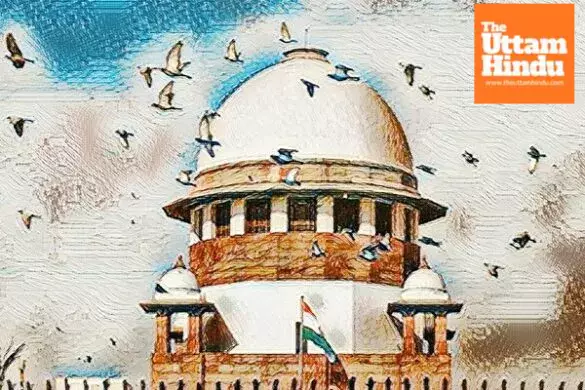Supreme Court Sets Condition on Anticipatory Bail Under SC/ST Act, CJI Draws ‘Laxman Rekha’

New Delhi (The Uttam Hindu)- In an important decision, the Supreme Court bench headed by the Chief Justice of the country, Justice BR Gavai said that anticipatory bail under the Scheduled Castes / Tribes (Prevention of Atrocities) Act can be accepted only if it can be proved prima facie that no crime has been committed under this Act.
A bench of CJI BR Gavai, Justice K Vinod Chandran and Justice NV Anjaria on Tuesday emphasized that the Scheduled Castes and Scheduled Tribes (Prevention of Atrocities) Act was brought with the aim of improving the socio-economic condition of the weaker sections and it prohibits the granting of pre-arrest bail to the accused. Along with this, the bench rejected the order of the Bombay High Court granting anticipatory bail to an accused facing charges of caste atrocities. Referring to Section 18 of the Scheduled Castes and Scheduled Tribes (Prevention of Atrocities) Act, the bench said that this provision is clearly about not applying Section 438 (relating to granting anticipatory bail) of the Code of Criminal Procedure (CRPC) and makes it a provision to exclude the hearing of applications filed under the section. The court said that along with this provision, Section 18 of the SC / ST Act prohibits the granting of anticipatory bail to the accused.
In fact, a bench of Chief Justice BR Gavai, Justice KV Chandran and Justice NV Anjaria gave this decision. Let us tell you that the bench quashed the order of Bombay High Court granting anticipatory bail to an accused. Let us tell you that the person had allegedly abused and humiliated the appellant publicly by mentioning his caste name. According to the report of Bar and Bench, it is being told that in the judgment written by Justice Anjaria, it was mentioned that prima facie the case is made out on the basis of the elements of the crimes punishable under Section 3 of the SC / ST Act. It was said that the accused beat the complainant with an iron rod and threatened to burn his house. The complainant's mother and aunt were also treated in the same way. They were also addressed with casteist abuses. The accused had allegedly insulted the complainant by the name of his caste. Along with this, he also threatened to burn the house. During this, the word 'Mangatyano' was clearly used with the intention of insulting the complainant. This insult was done because the complainant did not vote for a particular candidate in the Assembly elections, as per the wishes of the accused.
The Supreme Court clarified that while deciding whether a prima facie case is made out or not, lower courts cannot come within the scope of evidence by conducting mini trials. The court clarified that not having made out a prima facie crime is a situation where the court can reach this conclusion only on the basis of the statements given in the FIR. In such cases, the allegations given in the FIR will be quite decisive.
